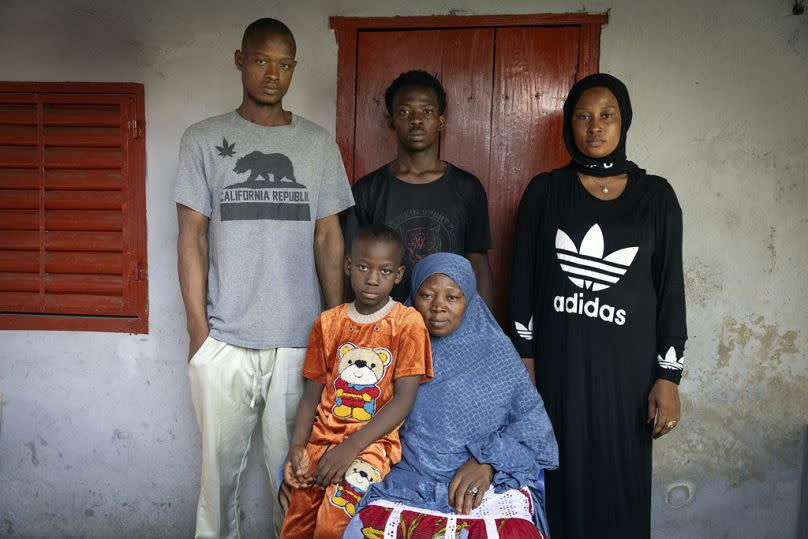'Squalid and chaotic': Reality of Italian migrant jails

It was still dark and quiet outside when Ousmane Sylla had his last prayer in the courtyard of an Italian migrant jail.
A few moments later, the silence of dawn was shattered. Chaos took over the detention and deportation centre of Ponte Galeria on the outskirts of Rome. The 21-year-old Guinean had been found dead in an apparent suicide.
Fellow detainees who discovered his body screamed for help and frantically tried to resuscitate him. When paramedics finally arrived, Sylla was gone.
Enraged by his death, migrants set mattresses on fire, broke down doors and threw stones at security forces inside the prison. The riots led to the arrest of 13 people.**
Sylla’s death in February shined a spotlight on the conditions inside these de-facto jails for migrants, raising questions about Italy’s migration policy as its government, led by far-right Prime Minister Giorgia Meloni, vowed to build more such facilities across the country as well as abroad.
The detention and deportation centres were established in 1999 and have been described as “black holes for human rights,” by lawyers and activists. The Italian government says they are essential to deterring migrants like Sylla from crossing the Mediterranean on smuggler’s boats.

Sylla’s journey from the West African nation of Guinea to Italy began in 2022. One of seven children, he dropped out of school during the COVID-19 pandemic. He learned masonry, but his real passion was singing. Sylla posted videos of himself on TikTok rhyming and gesturing his hands like a rapper.
“His dream was to become a big star, that everyone would say his name, and he would sing for everyone,” his older sister, Mariama Sylla, said from the family’s modest house in the outskirts of the capital, Conakry.
European Dream turns sour
To get to Europe, Sylla crossed the Sahara through Mali, Algeria and Tunisia. He made his way to the Tunisian coast, where smugglers move thousands of migrants from northern Africa to Europe on rickety boats.
This Central Mediterranean route is known as one of the deadliest migration crossings in the world; more than 2,500 people died or went missing last year alone.
After nearly drowning in the Mediterranean, Sylla finally reached the Italian island of Lampedusa on 29 July 2023.
Sylla was trying to join his older brother, who lives in France. But when he reached the border town of Ventimiglia on 9 August 2023, he was rejected by French authorities. After lying about his age in the hopes it would increase his chance of getting residency, Sylla was sent south, to a centre for underage migrants in the town of Cassino.
But the place was violent and dysfunctional, his brother and witnesses told AP. During his time in Cassino, Sylla told them he was repeatedly beaten up by other migrants.
According to witnesses working at the centre, the facility lacked basic services such as proper clothing, psychological support, and translators. Food deliveries, pocket money, and mobile data cards were also scarce.
On 13 October, Sylla received an order expelling him from the country. One day later, he was transferred to a detention and deportation centre in Trapani, the first of two migrant jails where he would spend the last four months of his life, according to Dario Asta, a lawyer who assisted Sylla.
Giuseppe Caradonna, another lawyer who tried to help Sylla, said that’s when a psychologist first flagged his mental health issues.
Caradonna informed local authorities on 14 November that Sylla’s mental and physical conditions made him unfit for detention and requested his transfer to a specialised facility.
However, the transfer request was denied, and on 5 January, a judge ordered him to be held for three more months.
'They abandoned him'
A fellow migrant detainee from Guinea-Bissau said that Sylla was taking daily medication provided by a doctor at the Trapani facility.
In late January, when a riot broke out in the centre, burning most of it, both of them were transferred to the Ponte Galeria detention centre near Rome.
As Sylla boarded the bus that would transfer him, a doctor handed him his case file, urging him to show it to staff at the new centre so he could get proper care.

But there is no evidence that the file was ever seen by any professional at the Rome detention centre and Sylla was never seen by the centre's psychologist. The centre, managed by an international detention and reception company called ORS, wouldn't comment on Sylla's treatment, but the contract confirmed they had a responsibility to provide psychological care to detainees.
Four days later, the young man took his own life.
Italy currently has 10 such migrant jails across the country, with a capacity to hold 700 foreigners under administrative detention at any one time. Two of them, including Trapani’s, are closed for upgrades.
In theory, the aim of the centres is deportation. However, according to Interior Ministry data, only 52% of migrants in detention centres are successfully expelled. The rest are eventually released with a self-expulsion order, unable to work or regularise their situation. Many fall into the underground economy or become prey to criminal groups.
The Italy-Albania migration deal is costly, cruel and counterproductive
Albanian parliament approves controversial deal to hold migrants for Italy
Rights groups and human rights lawyers have for years denounced and documented squalid conditions inside the migrant prisons, including the lack of adequate health services, over-prescription of psychiatric drugs to keep detainees sedated, and limited access for their lawyers and relatives.
From 2019 to 2024, 13 people had died — five by suicide — inside Italy’s detention centres, which also registered hundreds of suicide attempts and self-harm episodes.
Sylla’s relatives blame the Italian government for his death.
“I am so, so angry at them," Mariama told AP shortly after his burial in Conakry. “What they’ve done to my little brother, they abandoned him like he’s not a human being. I’m furious.”

 Yahoo News
Yahoo News 
